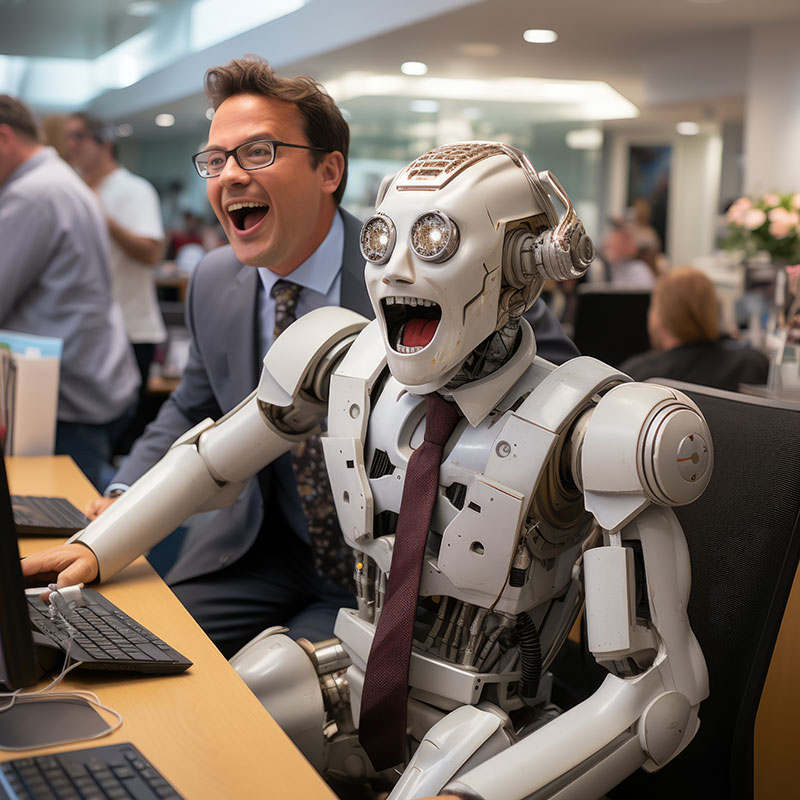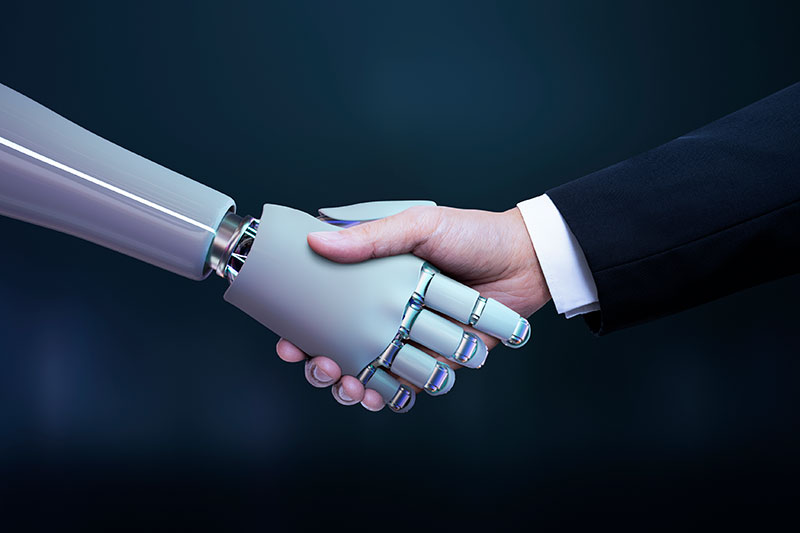The Download »
The C-Suite’s dance with data and empathy
Welcome to the future of leadership. It’s smarter, more agile, and more human than ever before. Are you ready to lead in this brave new world?


By Lineysha Jain
The age of automation is upon us, and it’s rewriting the rulebook on leadership. Artificial Intelligence, machine learning, and robotics aren’t just reshaping industries—they’re reshaping leaders themselves. What was once the sacred turf of the C-suite—where CEOs, CFOs, and CTOs made the calls from a high ivory tower—has now evolved into a dynamic collaboration space between human ingenuity and machine intelligence.


AI Takes the Wheel
Gone are the days when decisions in the C-suite were based on intuition. Now, the real decision-makers are data and AI. Armed with cutting-edge tools that can analyze vast oceans of information in a heartbeat, executives are making decisions faster and more accurately than ever before.
As the Founder and CEO of Green Gold Animation, Rajiv Chilaka, puts it, “I’ve seen the C-suite evolve dramatically over the past two decades. What began with a strong focus on technical skills now demands a blend of technological vision, cultural understanding, and creative insight. At Green Gold, our mission is to foster an environment where technology amplifies creative expression.”
Take the 2021 McKinsey study—it reportedly revealed that 60% of businesses using AI-driven tools had seen their decision making speed and accuracy soar. And they weren’t just making better decisions—they were doing so faster. In this new landscape, data is king. The more data a leader has, the more granular and precise their decisions can be. Think of it like this: AI doesn’t replace the human brain—it supercharges it, giving leaders the insights they need to act decisively.
“The biggest shift we need isn’t just in curriculum or technology. It’s in mindset,” says Karun Tadepalli, CEO, byteXL, adding, “Thriving in an AI-powered future means letting go of the illusion of certainty. The world is no longer linear, and neither is learning. In the past, you could master a skill and build a career around it for decades. Today, skills expire faster than textbooks. What we need is a culture of curiosity, adaptability, and continuous unlearning. This is not just about being ‘tech-savvy.’ It’s about cultivating a mindset that sees change not as a threat, but as a constant partner.”
Karun also points out, “As a leader, one lesson I’ve learned is that clarity is more important than control. The role of leadership now is to create environments where smart, driven people can experiment, fail safely, and grow fast.”
In a world flooded with data and ever-evolving algorithms, leaders need to be continuous learners, not just decision makers. Their AI partners are the eyes and ears, allowing them to navigate the noise and cut straight to what matters.
Emotional Intelligence in the Age of Automation
But let’s not kid ourselves: robots may be getting smarter, but they still can’t lead with heart. As automation handles the repetitive grunt work, leadership in the digital age is placing greater emphasis on emotional intelligence (EQ). “As automation continues to redefine how we operate, emotional intelligence is no longer optional, it is essential. Technology may drive efficiency, but it’s empathy, trust, and authentic human connection that truly empower teams and sustain long-term growth. The next generation of C-suite leaders will be defined by their emotional intelligence, resilience, and deep-rooted sense of purpose. These leaders will need to guide teams through ambiguity, inspire innovation, and build cultures that prioritize inclusivity and creative problem solving. Their ability to connect authentically, adapt swiftly, and encourage diversity in thinking will be paramount,” emphasizes Harish Kohli, President and Managing Director, Acer India.
Meanwhile, Murali Bukkapatnam, Chair, TiE Global Board of Trustees, states, “As AI reshapes industries, the real challenge isn’t just technical—it’s ethical. Technology is advancing faster than our policies or playbooks. And that puts an even greater burden on leadership. Ethical tech leadership begins
with humility. Are we listening to the voices often excluded from the room? Are we designing systems that are inclusive, equitable, and just? In a country like India, where diversity is not a buzzword but a lived reality, these questions are not optional—they’re foundational. We must champion diversity in the team’s building AI, because that’s how we build fairness into the systems themselves. AI can give us data, but only humans can provide the discernment to apply it wisely.”
Breaking Down Hierarchies
As automation liberates us from menial tasks, leadership structures are flattening. The rigid, top-down hierarchies of old are giving way to dynamic, decentralized teams. In today’s world, agility and flexibility are the names of the game.
“When I reflect on leadership today versus five years ago, the change feels both profound and personal,” says Murali Bukkapatnam. He adds, “There was a time when leadership was synonymous with clarity, direction, and delivering results against defined metrics. But the world has shifted—and so must we. Today, leadership is about creating cultures where people feel safe to question, to adapt, and to lead at every level. Tomorrow’s C-suite will be shaped by a new kind of intelligence—one rooted in empathy, cultural awareness, and the courage to make decisions that reflect values, not just valuations.”
In this new paradigm, AI plays a key role. It democratizes information, allowing teams at all levels to access insights in real-time and make strategic decisions without waiting for a C-suite approval. Leaders now find themselves in a collaborative role. As Swetank Shekhar, Founder and Director, Global Cloud Cayr, explains, “Balancing control with empowerment requires giving autonomy to team members while ensuring that a clear framework and support system is in place. It is important to empower leaders and encourage them to trust their teams and provide them with the tools and resources that they need to succeed.”
Proactive, Predictive, Personal
With AI at the helm, leaders can now create strategies that are predictive, data-informed, and tailored to individual consumer needs. AI helps executives spot trends before they become trends, identify new opportunities, and even predict future crises.
“The power of diverse teams cannot be overstated; by drawing on a range of perspectives, we reduce biases and unlock AI’s true potential. Coupled with a robust governance framework, continuous audits, and strict adherence to privacy standards, this ensures we uphold our responsibility to customers and society alike,” explains Harish Kohli, adding, “Responsible AI isn’t simply about regulatory compliance—it’s about ensuring that AI enhances human potential, fosters innovation, and drives long term, equitable growth while preserving trust at every level.”
AI is no longer a luxury—it’s a strategic necessity. With its ability to forecast market behavior, customer preferences, and operational risks, AI is reshaping how leaders think about long term growth. “One key leadership lesson for thriving in an AI powered future is embracing a mindset of continuous learning and adaptability. Technology is evolving rapidly, and the leaders who succeed will be those who stay curious, open to change, and comfortable navigating ambiguity,” Harish Kohli affirms.
Ethics, Accountability, and the Human Touch
As powerful as AI is, it’s not without its ethical challenges. From algorithmic bias to data privacy, the integration of AI into leadership comes with a responsibility: to ensure that AI is used ethically, fairly, and transparently. Leaders in the C-suite are now tasked with balancing the benefits of automation with the social implications it brings.
Swetank Shekhar emphasizes the profound impact of artificial intelligence (AI) on humanity. “One has to incorporate diverse perspective in the design and implementation to ensure that AI technologies do not perpetuate biases and are inclusive. This requires implementing continuous monitoring and evaluation of AI systems to detect and mitigate any unintended consequences or biases. One of the key success factors is to provide training and awareness among employees about the ethical implications of AI and the importance of responsible technology use.”
As AI continues to transform businesses, C-suite leaders must be the stewards of ethical AI practices, ensuring that their automation efforts benefit not just their companies but also society at large.
To conclude in the words of Karun Tadepalli, “The future of work will belong to those who combine deep thinking with dynamic learning. We’re shaping mindsets that can outlast any single wave of technology.”
